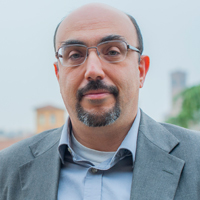Bio
Eugene Finkel is Kenneth H. Keller Professor of International Affairs
Academic and Faculty Liaison at SAIS Europe
Eugene (Evgeny) Finkel works at the intersection of political science and history. He was born in Ukraine and grew up in Israel. Finkel received a BA in Political Science and International Relations at the Hebrew University of Jerusalem and a PhD in Political Science at the University of Wisconsin-Madison. His research focuses on how institutions and individuals respond to extreme situations: mass violence, state collapse, and rapid change.
Finkel's most recent book is
Intent to Destroy: Russia's Two-Hundred-Year Quest to Dominate Ukraine (Basic Books, 2024). He is also the author of
Ordinary Jews: Choice and Survival during the Holocaust (Princeton University Press, 2017),
Reform and Rebellion in Weak States (Cambridge University Press, 2020, co-authored with Scott Gehlbach) and
Bread and Autocracy: Food, Politics and Security in Putin’s Russia (Oxford University Press, 2023, co-authored with Janetta Azarieva and Yitzhak M. Brudny). His articles have appeared in the
American Political Science Review, Journal of Politics, Comparative Political Studies, Comparative Politics, East European Politics and Societies, Slavic Review, and several other journals and edited volumes. Finkel also published articles and op-eds in
The Washington Post, Los Angeles Times, Foreign Affairs, The Spectator and other outlets. For a recent curriculum vitae including a full list of publications,
click here.
Courses
- State, Society & Violence in Russia & Eastern Europe
Violence between, but especially within states is a critical and constant feature of Russian and Eastern European politics and societies, both in the past and nowadays. These events can be large scale, such as wars, ethnic conflicts, revolutions and genocides, but also less visible, such as criminal violence or police brutality. Whereas some instances of violence are well known, only recently experts have started paying serious attention to understanding the many forms of violence in Russia and Eastern Europe. The goal of this class is to introduce students to the different types of political and social violence in Russia and Eastern Europe since 1945, their causes, forms and impact. The class will present the key research on various aspects of violence in Russia and Eastern Europe, will discuss the similarities and differences between types and forms of violence, and will analyze the different approaches to studying violence in the region. We will also discuss the impact of violence on the societies and the people of the region and the ways to prevent, manage, and overcome violence in the post-communist world.
- Autocracy from Early States to the 21st Century
Autocracy is the most prevalent regime type throughout human history and more than a half of world's population currently live in authoritarian states. This class focuses on the development of autocracy as a global phenomenon from the early states to the 21st century. We will discuss the historical evolution of this regime type, how and why autocracies are born and die, varieties of autocracy, the sources of autocratic stability and collapse, autocratic governance, how autocracies respond to crises and the external and domestic challenges authoritarian rulers and societies face in contemporary world.
- Genocide and Mass Violence
Genocide is often described as the worst of crimes, the nadir of human behavior, and the world’s most “odious scourge.” The goal of this course is to examine the origins and causes of genocide and to introduce students to the key works and major debates in the growing field of genocide and mass violence research. This course is divided into three parts. First, we will discuss how genocide is conceptualized and defined, explore the theories that try to explain why
genocides occur, and discuss why people may participate in genocidal killing. In the second part we will examine several key case studies of genocide and mass violence. Third, we will complete the course by debating policy approaches to genocide and mass violence including prevention, intervention, post-genocide justice, reconciliation and memory.
